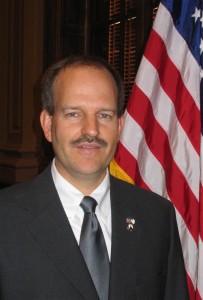Georgia Follows more Prudent Budgeting
By Sen. Chip Pearson

ATLANTA (May 13, 2010) – Backers of the reckless spending that has permeated Washington have found company in our European neighbors. The mega bailouts on which modern governments rely threaten to drown entire countries in their own debt. Greece’s bailout package worth $1 trillion further perpetuates this “culture of cash” on an international scale. While our country continues to weaken the dollar by spending its way to an unprecedented deficit, we’ve seen the euro slide to a 14-month low amid worldwide financial unease. In such global instability, a fiscally responsible approach is the best answer to steadying our economy and protecting our country from the downfall of others.
Teetering on the brink of financial collapse, Greece is in need of a certain level of financial assistance simply to prevent its fiscal ailments from spreading to other countries. However, throwing good money after bad is not the answer. Just look at where the bailout packages put the U.S. and Europe in the long run financially.
Washington’s “rescue” of American industries including the housing, auto and financial markets has set us back $11 trillion, a figure so large it’s almost incomprehensible. This level of spending only widens the hole in U.S. debt, something our European neighbors will soon experience. Greece’s deficit reached 13.6 percent of its gross domestic product (GDP) in 2009, far exceeding the European Union’s 3 percent limit. The deficit is expected to balloon to around 150 percent of its GDP by the end of next year, according to the International Monetary Fund’s 2009 report.
The U.S. is not far behind, with a deficit worth 10.6 percent of our GDP. The Congressional Budget Office recently reported that the president’s Fiscal Year 2011 budget will generate nearly $10 trillion in cumulative budget deficits over the next 10 years. This is $1.2 trillion more than the administration projected, and will raise the federal debt to 90 percent of our GDP by 2020.
The CBO has also noted that U.S. debt is currently higher relative to GDP than it has been in more than 50 years. A presentation by CBO Director Douglas Elmendorf on U.S. fiscal policy after the financial crisis and recession notes, “Given current law and certain changes to that law that are broadly supported by the Administration and Congress, the budget deficit and debt are on a worrisome path—unsustainable in the long run and posing growing risks even during the next several years.”
We could even be headed for another bailout now that Fannie Mae is asking the federal government for an additional $8.4 billion after the mortgage investor lost $11.5 billion in its first quarter. The government will have poured $145 billion into both Fannie Mae and Freddie Mac since it took control over the firms in 2008 to prevent a complete collapse of the U.S. housing market.
The sheer level of debt that both Greece and the U.S. will experience as a result of these bailouts is proof that ignoring fiscally responsible solutions will drive the economy into further freefall.
Despite the federal government’s refusal to heed the warning signs, Georgia state lawmakers took proactive steps this session to create an environment of responsible spending and smaller government. We successfully reduced the footprint of state government by 24 percent. We’re committed to doing more with less, and living within our means. After cutting $2 billion from the budget, we’ve ensured that Georgia won’t have to contend with the perils of a bloated state budget.
We also enacted a zero-based budgeting system that will require legislators to scrutinize every inch of the budget. Currently, Georgia prepares its budget on a “continuation” basis, which assumes that all current spending will be carried forward and legislators only examine proposed increases. This is a common-sense first step to reducing waste in government. We’re also preparing for the future by incentivizing the private market. Capital gains taxes will be cut 25 percent when the state’s rainy day fund reaches $1 billion, rising to a 50 percent cut in subsequent years.
We cannot depend on government to solve our economic woes. For the future health of our country, it’s imperative that we stabilize our marketplace and limit government spending. By strengthening our own economy using a fiscally conservative approach, we can give our country a fighting chance amid the rising deficits of our neighbors.
Sen. Chip Pearson serves as chairman of the Economic Development Committee. He represents the 51st Senate District which includes Dawson, Fannin, Gilmer, Lumpkin, Pickens, and Union counties and portions of Forsyth and White counties. He may be reached at 404.656.9221 or via e-mail at chip.pearson@senate.ga.gov.
COLUMN
For Immediate Release:
May 13, 2010
For Information Contact:
Raegan Weber, Director
Kallarin Richards, Senior Communications Specialist
kallarin.richards@senate.ga.gov
404.656.0028